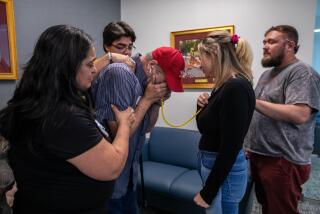‘Rivers’ handles organ transplant with care
“Three Rivers”
CBS, Sunday, Oct. 18, 9 p.m.
Episode: “Good Intentions”
The premise
Teenage alcohol and drug abuser Scott Becker (Shiloh Fernandez) has been admitted to Three Rivers Regional Medical Center, a top transplant center in Pittsburgh. Scott has severe heart failure, caused by an enlargement of the heart (known as cardiomegaly). Specifically, he has dilated heart chambers and a “regional wall abnormality” that prevents the heart from pumping properly. A cardiac angiogram has revealed that he has normal coronary arteries. Because Scott has not used drugs in six months, Dr. Andy Yablonski (Alex O’Loughlin), the head transplant surgeon, is able to persuade a transplant committee to ask the United Network for Organ Sharing to put Scott on the list for heart transplant. The day that Scott is added to the list, a compatible heart donor is found in Portland, Maine. The transplant coordinators fly to Maine to receive the heart, but Scott becomes anxious and disappears, feeling he doesn’t deserve the heart. Andy tries to find him before the heart arrives.
The medical questions
Can cocaine cause a heart attack and severe heart failure? If so, could the attack damage one wall of the heart without affecting the coronary arteries that supply the heart? Would such a patient be a candidate for heart transplant if he had successfully quit taking illegal drugs? Would his own coronaries be used or would they be supplied by the donor? Could he go to the front of the list so quickly?
The reality
Cocaine can cause heart attacks and heart failure, but usually does so by prematurely clogging the coronary arteries, says Dr. Sandeep Jauhar, director of the Heart Failure Program at Long Island Jewish Medical Center. More rarely, he says, it can lead to a heart attack by causing the arteries to spasm.
Dr. Jignesh Patel, associate medical director of the UCLA Heart Transplant Program, says such a spasm can lead to damage of particular walls of the heart (regional wall abnormalities).
Drug addicts could be eligible for heart transplant, Patel says, but -- as with all transplant candidates -- would need to pass both psychiatric and social work evaluations. They also would generally have to successfully complete a rehab program and demonstrate by random toxicology screens -- at least six months of abstinence, he adds.
Of note, the show accurately suggests that Yablonski’s opinion alone wouldn’t be sufficient to get a candidate on the organ wait list; a transplant committee’s approval would be required.
As for those arteries, they’re transplanted along with the donor heart, so the fact that Scott’s are healthy wouldn’t be a factor.
Very sick patients may be priority listed for transplant (status 1A), Patel says, but to justify this status, the patient would have to be very unstable and likely maintained on a constant IV infusion of drugs and subject to advanced heart monitoring.
On the show, that’s the reality for Scott.
--
Siegel is an associate professor of medicine at New York University’s School of Medicine. marc@doctorsiegel.com
More to Read
The complete guide to home viewing
Get Screen Gab for everything about the TV shows and streaming movies everyone’s talking about.
You may occasionally receive promotional content from the Los Angeles Times.






